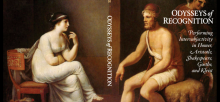‘Recognition’ is a key term in several urgent discourses today. The politics of recognition demand attention for marginalized identities in the public sphere. Philosophers of recognition demonstrate what we can and cannot know. Literary recognition is a technical term for a climactic plot device. In contrast to scholars in these three fields, Odysseys of Recognition claims that interpersonal recognition is constituted by performance. For the first time in recognition studies, it brings performance theory in dialogue with poetics, politics, and philosophy.
By observing Odysseus figures from Homer, Shakespeare, Goethe, and Kleist, Wiggins offers an alternative to conventional intellectual histories that situate the invention of the interior self in modernity. Through strategic readings of Aristotle, his study recovers an understanding of interpersonal recognition that has become strange and counterintuitive. Penelope in Homer’s Odyssey offers a model for agency in ethical knowledge that has a lot to teach us today. Early modern and eighteenth-century characters, meanwhile, discover themselves not deep within their subjectivity, but in the interpersonal space between people in the world. Recognition, Wiggins contends, is the moment in which epistemology and ethics coincide: in which what we know becomes manifest in what we do.
